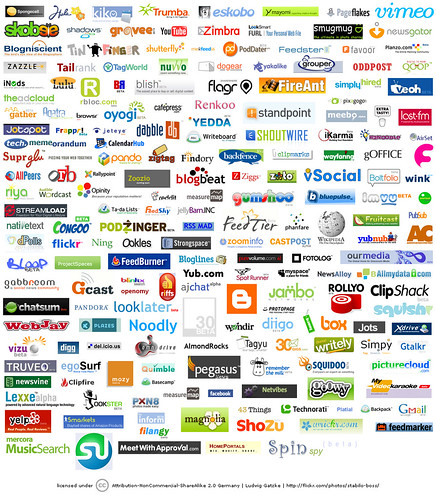College Students and Social Media – Take Action Now on MySpace and Facebook Profiles
We have cautioned students on more than one occasion to think very carefully about the items they post on their social networking profile. The stories of Stacy Snyder and Kevin Colvin provide great examples of why one must carefully guard their personal online brand.
Of course, many current students as well as adults in their twenties and thirties have cried foul over what they deem an invasion into their private worlds. They argue that doing something on their own time, whether it be in poor taste or not, should play no role in their everyday world of work.
Prospective and current college students with such a mindset need to think again – even those who understand the need for student privacy note that using social networking profiles for admissions or job-placement is reasonable.
S. Craig Watkins

To get a sense of the thresholds for using profiles, we turn to the Wired Campus blog at the Chronicle of Higher Education and the recent Q & A with S. Craig Watkins, an associate professor of radio, TV, and film at the University of Texas at Austin. Watkins recently penned “The Young and the Digital: What the Migration to Social Network Sites, Games, and Anytime, Anywhere Media Means for Our Future” and is deemed an expert in matters related to the “new age of social networking and media.”
Indeed, Professor Watkins seems to have a great sense as to what the current crop of college students bring to their respective campuses. He rightly acknowledges that we digital natives are tired of the lecture format and therefore want a more engaging learning environment.
He also notes that we prefer a classroom that actively utilizes the vast world of technology and all its elements (laptops, netbooks, pda’s and cell phones) to enhance the learning environment.
Given his stature and understanding of current culture, students must carefully consider his insight into the whole Facebook and MySpace privacy discussion.
Online Profiles and Digital Monitoring
Watkins is clear about one trend he is not in favor of, that of colleges policing material on social networking sites, specifically to determine if the postings represent facets of campus life. When asked if it is a college administrator’s responsibility to be checking up on students through online profiles, Watkins states:
“I would encourage universities not to use technologies in that way — as a surveillance mechanism or tool. I would be reluctant to agree with or believe that’s an appropriate use of the tool.”
But while Watkins sees the monitoring of such sites as off limits for policing students, he offers a very different view when it comes to college admissions officers looking through student profiles when screening applicants.
 “I don’t necessarily have a problem with that,” states Watkins. “The problem becomes if they start fishing for unflattering or potentially damaging kind of content — pictures or wall posts — sort of deliberately using it to hunt for that kind of content, as opposed to simply trying to make maybe a better informed, insightful admission decision about a student. It is an opportunity to learn about people’s interest, the kinds of things they are engaged in, in terms of community-related issues and social issues. In that sense, it does provide a window into a person’s life, and into a person’s interests that can be a value to an admissions committee.”
“I don’t necessarily have a problem with that,” states Watkins. “The problem becomes if they start fishing for unflattering or potentially damaging kind of content — pictures or wall posts — sort of deliberately using it to hunt for that kind of content, as opposed to simply trying to make maybe a better informed, insightful admission decision about a student. It is an opportunity to learn about people’s interest, the kinds of things they are engaged in, in terms of community-related issues and social issues. In that sense, it does provide a window into a person’s life, and into a person’s interests that can be a value to an admissions committee.”
And as for employers looking, Watkins insists it is now a permanent part of the hiring landscape.
“That’s becoming more and more of a common practice. Graduating students, one of the things that they indicated is that when they went out for interviews for jobs, one of the first thing they were asked is, ‘Are you on MySpace?’ or, ‘Are you on Facebook?’ Their potential employers wanted to get access to their profiles.”
Clearly, when it comes to selecting a new employee businesses want to be certain they are making the right choice. And because of the importance to them in making the right hire, students can expect potential employers to do some digging to see if they turn up anything negative.
Not too surprisingly, Watkins notes that such questions routinely cause a certain amount of panic among the group of students who have failed to consider the importance of their personal brand. In a flurry of activity, they attempt to undo any damage that has been years in the making.
Don’t be one of the foolish ones – carefully think about everything you post online. While it is possible, sometimes, to take down questionable materials prior to the wrong person seeing them, the chance that you will miss something is very high.
And don’t try to convince yourself that decision-makers looking at such profiles is somehow an invasion of privacy. If something should truly be kept private, then don’t post it online.
Flickr photo courtesy of Stabilo Boss.


Good point, Thomas.
We live in a world now where if you post something semi-private on a Facebook profile, that information can be public domain for the 500 friends you have (and all the connections that are connected with those people), so we must be careful what we choose to post on our public profiles. There have even been instances where someone’s Facebook profile will get posted on Digg.com!
This is great information on the cautionary measures that students should take when using social media. The fact of the matter is though that students can use social media to their advantage when applying for college. http://mycollegeguide.org/blog/?p=65